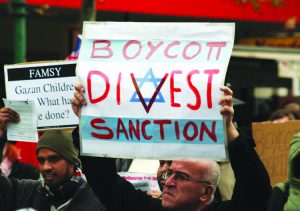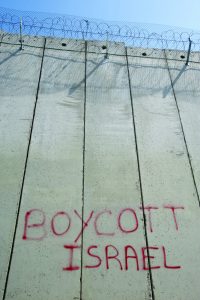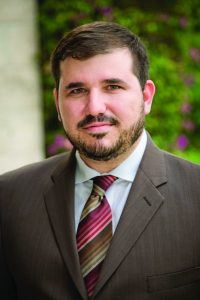
by: Joseph Sabag, Israel Allies Foundation

Photo: Takver/ wikipedia.org
In May of 2015, South Carolina became the first state in America to adopt modernized legislation regulating against the problem of commercial discrimination and boycotts of Israel. The bill passed unanimously, and was the result of nearly two years of legal research, policy development and educational resourcing by the Israel Allies Foundation (IAF) and its experts. Since that time, 12 more state laws regulating against commercial discrimination and boycotts of Israel have been adopted in America, after an intensive push by the pro-Israel community.
What we have learned thus far is that legislation will play a significant role in defeating the Boycott, Divestment, Sanctions (BDS) Movement’s effort to promote commercial discrimination and boycotts of Israel. More important, however, is the effort that must be exerted to win the underlying war of delegitimization and demonization being waged. Given the often hateful nature of BDS and its destructive goals, dialog is not the answer. The ugly rhetoric and wild falsehoods that prevail throughout the BDS Movement demand that the pro-Israel community waste no time and effort trying to reason with such committed enemies. We must simply work to defeat them.
What we are fighting for are the hearts and minds of the many uninformed people who have yet to develop an understanding of Israel and the threats she faces. Israel’s detractors have used dishonesty and hatred to rally their supporters against the Jewish state. To win, we must, therefore, relentlessly expose the illegitimacy of the BDS movement’s rhetoric before the eyes of the world.
The goal of defeating BDS demands moral clarity. Given the massive amount of documentation that is publicly available, no one should be hesitant to call out the anti-Semitism of the BDS movement or ignore its true aim of working toward Israel’s destruction. To be clear, legitimate criticism of Israel does exist and is certainly necessary; however, the often dishonest and downright prejudiced arena of the BDS movement is not where such conversation can legitimately take place.
The very beating heart of the BDS movement is the lie of occupation. The bottom line is that the Jewish state of Israel is not an occupier in the Land of Israel, the Jew’s ancestral homeland. The life’s work of my teacher, the late Mr. Howard Grief of blessed memory, was a master legal treatise called “The Legal Foundation and Borders of Israel under International Law.” The gift that Mr. Grief left us must not be overlooked, and I urge all who advocate for Israel to obtain a copy.

Photo: Ryan Roderick Beiler/ shutterstock.com
“Occupation” is a legal term whose definition does not apply to Israel under the law. Nevertheless, the term is intentionally misused against Israel in order to shape negative perceptions of her history and legitimacy, while perpetuating a sense of Palestinian–Arab victimhood. In this context, “occupier” is nothing more than a polite way of calling Israel a thief, suggesting that Jewish invaders colonized territory belonging to the Arabs, and which therefore must be restored to its rightful, victimized owners. The term also gives Israel’s enemies a way to try to explain away terrorism as merely “resistance to occupation.” Given the negative connotation of the term “occupier,” the BDS movement uses the word as often as possible in its messaging, leading to its casual use by the media and its eventual use by policymakers.
The corrupting power of the occupation lie is far reaching, to such an extent that it has turned the noble endeavor of peacemaking into a problematic enterprise for Israel’s part. There are only two rationales on which the Two State Solution is supported. One is the disengagement perspective. The disengagement perspective is motivated by the basic idea that two incompatible peoples have unfortunately found themselves residing in the same space, and that it is desirable to see them separated for the sake of peace. This was the intention of Bill Clinton and George W. Bush, and those prime ministers who chose the path of exchanging land for peace.
The second rationale, however, is the occupation perspective. The occupation perspective dictates that Israel has stolen Arab territory and suppressed their right to self-determination, and must now restore it to them. Those who listen carefully will find that this is the perspective of J Street, President Obama and the State Department, who regularly speak of Israel as an occupier and refer to parts of Israel as being territorially illegitimate.
It is one thing to advocate a Two State Solution as a matter of seeking peace, and entirely another when premised on the lie of occupation. The difficulty in grasping this distinction has escaped far too many supporters of Israel, who unfortunately tend to believe that all who propose the same solution are relative and equivalent in their intentions. They are not. I am sorry to inform, particularly those who support the idea of land for peace, that in the United States of America, the forwarding of the Two State Solution is presently viewed by everyone, except the pro-Israel community, as a de facto indictment of Israel as an occupier.
Understanding the profound harm that the lie of occupation causes, particularly in fueling BDS, I am compelled to confront the tolerance, and frankly the acquiescence, of our own pro-Israel community to the occupation narrative, which has reached epidemic levels. Language has been weaponized against us, not just by the use of the term occupation itself, which you’ll find used by more than enough of Israel’s own media outlets and institutions, but through the casual and common use of other related terms that I ask you to take notice of as well, such as “West Bank, East Jerusalem and settlements.” Those who support Israel should not make use of terms that portray her as an occupier. Over 100 years ago, Justice Brandeis wisely stated: “Sunlight is the best disinfectant.” Unless the lie of occupation is exposed and dismissed, BDS will always exist.
 Joseph Sabag is the U.S. national director of the Israel Allies Foundation in Washington D.C. As an attorney and Israel policy specialist he has advised numerous legislators at the state and federal level over the past decade. Joseph previously served as special counsel to Florida State Representative Adam Hasner, the lead House sponsor of the country’s first Iran divestment legislation. In the last four years, Joseph has drafted and led the passage of legislation and key policy resolutions in over half the states in America.
Joseph Sabag is the U.S. national director of the Israel Allies Foundation in Washington D.C. As an attorney and Israel policy specialist he has advised numerous legislators at the state and federal level over the past decade. Joseph previously served as special counsel to Florida State Representative Adam Hasner, the lead House sponsor of the country’s first Iran divestment legislation. In the last four years, Joseph has drafted and led the passage of legislation and key policy resolutions in over half the states in America.
All logos and trademarks in this site are property of their respective owner. All other materials are property of Bridges for Peace. Copyright © 2025.
Website Site Design by J-Town Internet Services Ltd. - Based in Jerusalem and Serving the World.